【新课标】Unit 13 SectionA(Grammar Focus-4c)课件(新目标九年级Unit13We’re trying to save the earth)
文档属性
| 名称 | 【新课标】Unit 13 SectionA(Grammar Focus-4c)课件(新目标九年级Unit13We’re trying to save the earth) |
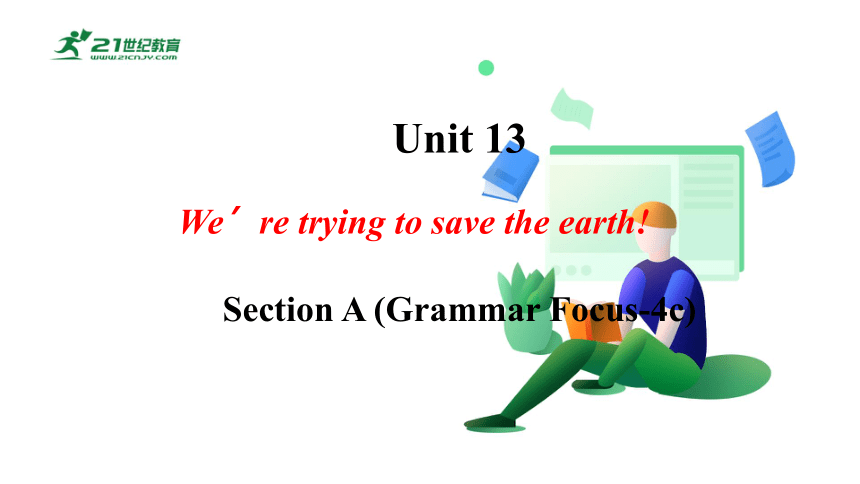
|
|
| 格式 | pptx | ||
| 文件大小 | 1.3MB | ||
| 资源类型 | 试卷 | ||
| 版本资源 | 人教新目标(Go for it)版 | ||
| 科目 | 英语 | ||
| 更新时间 | 2023-11-06 00:00:00 | ||
图片预览

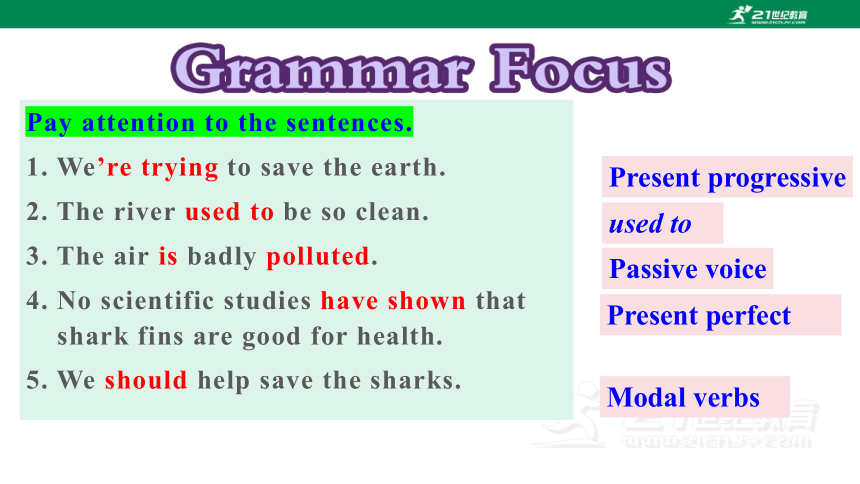
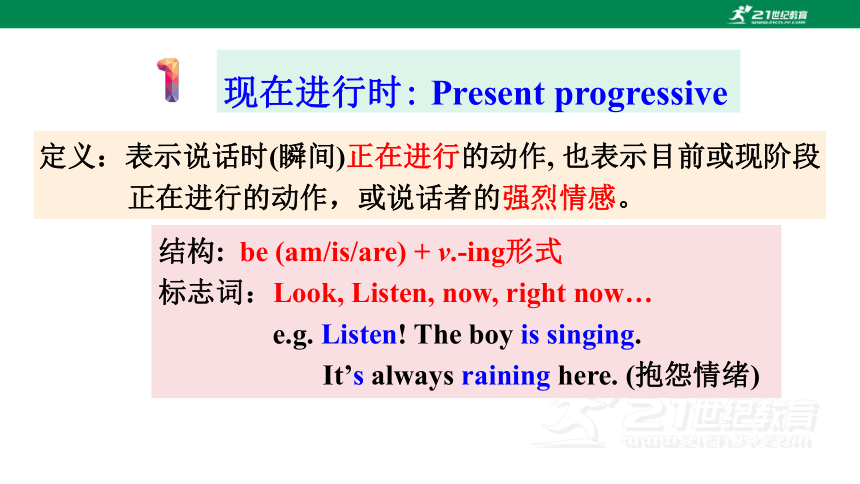
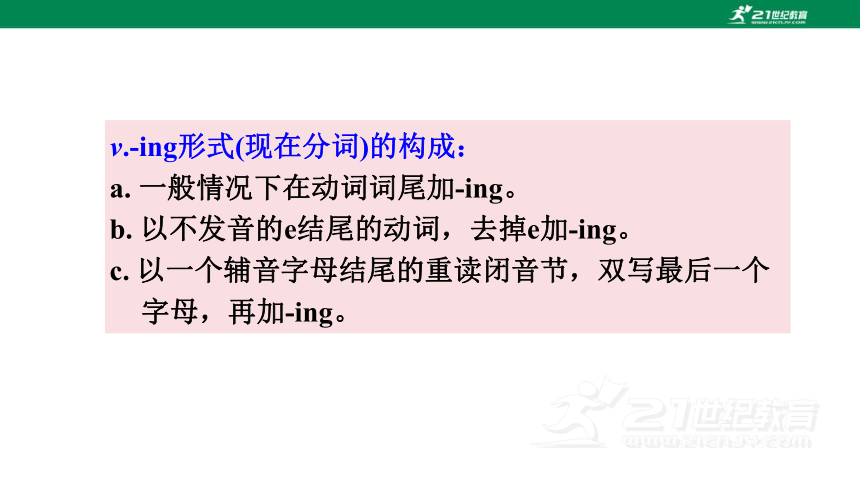
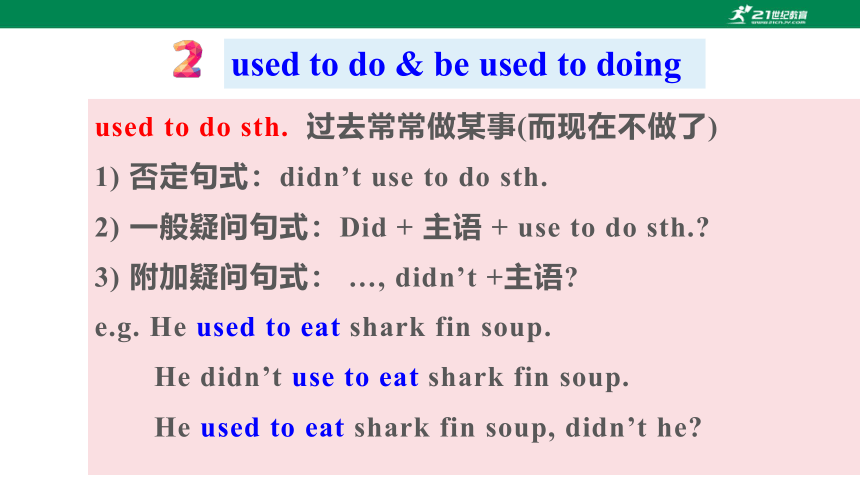
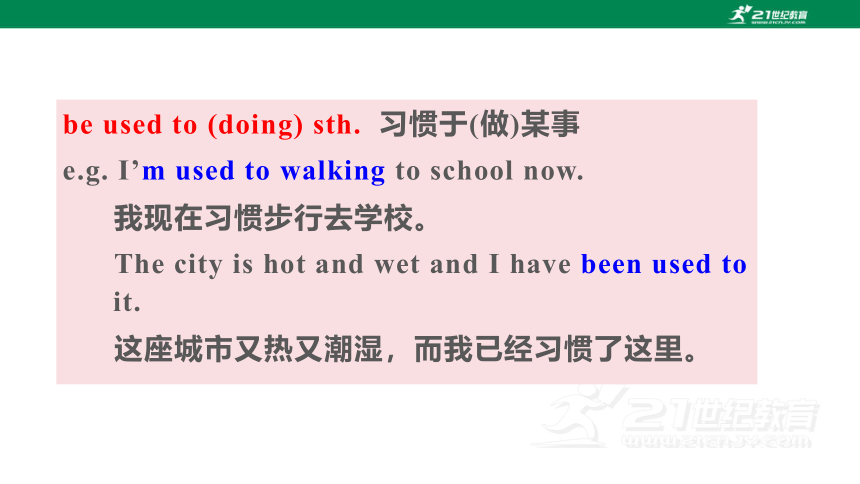
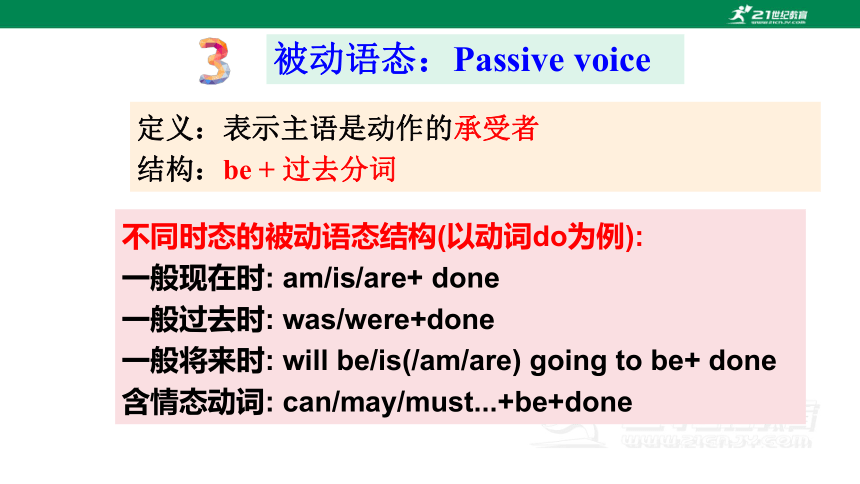
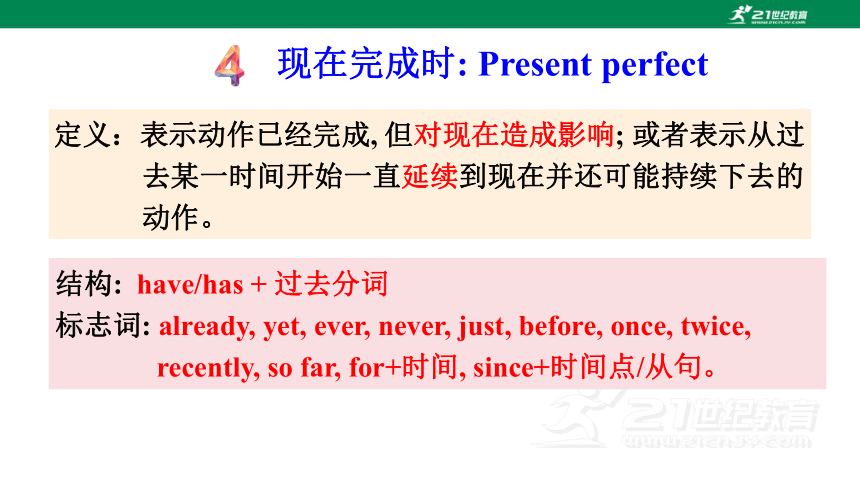
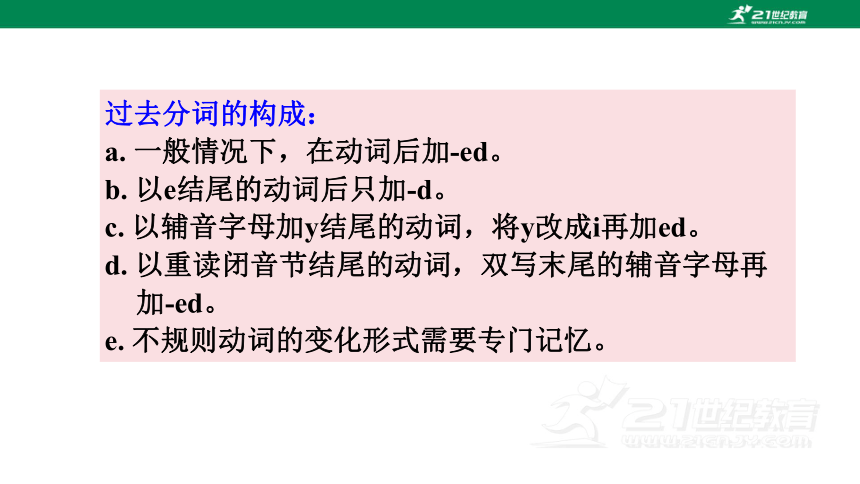
文档简介
(共22张PPT)
Unit 13
Section A (Grammar Focus-4c)
We’re trying to save the earth!
Pay attention to the sentences.
1. We’re trying to save the earth.
2. The river used to be so clean.
3. The air is badly polluted.
4. No scientific studies have shown that shark fins are good for health.
5. We should help save the sharks.
Present progressive
used to
Passive voice
Present perfect
Modal verbs
现在进行时: Present progressive
结构: be (am/is/are) + v.-ing形式
标志词:Look, Listen, now, right now…
e.g. Listen! The boy is singing.
It’s always raining here. (抱怨情绪)
定义:表示说话时(瞬间)正在进行的动作, 也表示目前或现阶段正在进行的动作,或说话者的强烈情感。
v.-ing形式(现在分词)的构成:
a. 一般情况下在动词词尾加-ing。
b. 以不发音的e结尾的动词,去掉e加-ing。
c. 以一个辅音字母结尾的重读闭音节,双写最后一个字母,再加-ing。
used to do sth. 过去常常做某事(而现在不做了)
1) 否定句式:didn’t use to do sth.
2) 一般疑问句式:Did + 主语 + use to do sth.
3) 附加疑问句式: …, didn’t +主语
e.g. He used to eat shark fin soup.
He didn’t use to eat shark fin soup.
He used to eat shark fin soup, didn’t he
used to do & be used to doing
be used to (doing) sth. 习惯于(做)某事
e.g. I’m used to walking to school now.
我现在习惯步行去学校。
The city is hot and wet and I have been used to it.
这座城市又热又潮湿,而我已经习惯了这里。
被动语态:Passive voice
定义:表示主语是动作的承受者
结构:be + 过去分词
不同时态的被动语态结构(以动词do为例):
一般现在时: am/is/are+ done
一般过去时: was/were+done
一般将来时: will be/is(/am/are) going to be+ done
含情态动词: can/may/must...+be+done
结构: have/has + 过去分词
标志词: already, yet, ever, never, just, before, once, twice, recently, so far, for+时间, since+时间点/从句。
定义:表示动作已经完成, 但对现在造成影响; 或者表示从过去某一时间开始一直延续到现在并还可能持续下去的动作。
现在完成时: Present perfect
过去分词的构成:
a. 一般情况下,在动词后加-ed。
b. 以e结尾的动词后只加-d。
c. 以辅音字母加y结尾的动词,将y改成i再加ed。
d. 以重读闭音节结尾的动词,双写末尾的辅音字母再加-ed。
e. 不规则动词的变化形式需要专门记忆。
have been to 去过某地, 说话时已从该地回来。
have gone to 去了某地, 说话时可能在途中或已到达目的
地, 尚未返回。
have been in 已在某地, 常与表示一段时间的状语连用。
e.g. Jim has gone to London with his family.
The Greens have been in China for two years.
Have you been to Beijing before
have been to, have gone to & have been in
情态动词本身有一定的词义, 表示说话人的情感、态度或 语气, 但不能单独作谓语, 只能与其他动词构成谓语。
常见的情态动词有:
can/could (能够), may/might (可能、可以), must (必须), need (需要), shall (将,多用第一人称), should (应该), will (将), would (愿意、将要), have to (不得不)等。
情态动词 Modal verbs
情态动词无人称和数的变化, 后接动词原形。
否定式是在情态动词后面加not。
个别情态动词有过去式形式, 可用来表达更加客气、委婉的语气。
e.g. Ken can climb up the trees like a koala.
Tracy could ride a bicycle when she was five years old.
You mustn’t play with fire. It is dangerous.
Fill in the blanks with the correct forms of the verbs in brackets.
Joe: _______ you ever _______ (take) part in an environmental project
Eric: Yes, I have. I ________ (help) with a Clean-Up Day last year. It was _________ (consider) the biggest clean-up project this city ________ ever ________ (have).
Have
taken
helped
considered
had
had
Joe: How many people _______ (take) part
Eric: I _______ (think) more than 1,000 people _______ (come) to help out.
Joe: That’s fantastic! I guess everyone in this city is _______ (try) to improve the environment.
Eric: Yes, we can’t afford to _______ (wait) any longer to take action!
took
think
came
trying
wait
afford v. 承担得起; 买得起; 提供, 给予
常与can, be able to等连用, 多用于否定句或疑问句。
afford sth. 买得起 / 承受得起某物
afford to do sth. 有能力做某事 / 负担得起做某事
e.g. Can you afford the mobile phone
We can’t afford to pay such a price.
We can’t afford to wait any longer to take action!
我们承担不起继续等待而不采取行动!
afford & buy
afford 侧重“有经济能力买”
buy 侧重“购买(这一行为)”
【语境应用】用afford或buy的 适当形式填空。
1) They can’t ________ to send their children to college.
2) Can you ________ a new car
3) Helen ________ some fruit on her way home yesterday.
afford
afford
bought
Fill in the blanks with the appropriate modal verbs from the box.
People ______________ think that big things _____________ be done to save the earth. Many forget that saving the earth begins with small things. For example, you ________________ save electricity by turning off the lights when you leave a room. You ________________ also use reusable bags instead of plastic bags.
may/might
must/have to
can, would, could, have to, should, must, may/might
can/could/should
can/could/should
I think it’s a great idea that you now ______________ pay for plastic bags in some stores. And instead of driving to school or work, you _______________ ride your bike or walk. If it’s far, you ______________ take the bus. All these small things _______________ add up and become big things that _______________ improve the environment. Let’s take action now!
have to
can/could/should
can/could
can, would, could, have to, should, must, may / might
can/could
can/could/would
Make a list of things that people can do to help the environment and discuss your list with your partner.
use public transportation (n.交通运输)
turn off the lights when you leave a room
take your own shopping bags when you go shopping
don’t use disposable (adj. 一次性的) items like disposable cutlery (n. 餐具), cameras, etc.
reduce the use of air conditioners in summer
grow more plants
…
I think that everyone should use public transportation.
I disagree. It’s difficult for parents with young children to use public transportation…
Thank you!
Unit 13
Section A (Grammar Focus-4c)
We’re trying to save the earth!
Pay attention to the sentences.
1. We’re trying to save the earth.
2. The river used to be so clean.
3. The air is badly polluted.
4. No scientific studies have shown that shark fins are good for health.
5. We should help save the sharks.
Present progressive
used to
Passive voice
Present perfect
Modal verbs
现在进行时: Present progressive
结构: be (am/is/are) + v.-ing形式
标志词:Look, Listen, now, right now…
e.g. Listen! The boy is singing.
It’s always raining here. (抱怨情绪)
定义:表示说话时(瞬间)正在进行的动作, 也表示目前或现阶段正在进行的动作,或说话者的强烈情感。
v.-ing形式(现在分词)的构成:
a. 一般情况下在动词词尾加-ing。
b. 以不发音的e结尾的动词,去掉e加-ing。
c. 以一个辅音字母结尾的重读闭音节,双写最后一个字母,再加-ing。
used to do sth. 过去常常做某事(而现在不做了)
1) 否定句式:didn’t use to do sth.
2) 一般疑问句式:Did + 主语 + use to do sth.
3) 附加疑问句式: …, didn’t +主语
e.g. He used to eat shark fin soup.
He didn’t use to eat shark fin soup.
He used to eat shark fin soup, didn’t he
used to do & be used to doing
be used to (doing) sth. 习惯于(做)某事
e.g. I’m used to walking to school now.
我现在习惯步行去学校。
The city is hot and wet and I have been used to it.
这座城市又热又潮湿,而我已经习惯了这里。
被动语态:Passive voice
定义:表示主语是动作的承受者
结构:be + 过去分词
不同时态的被动语态结构(以动词do为例):
一般现在时: am/is/are+ done
一般过去时: was/were+done
一般将来时: will be/is(/am/are) going to be+ done
含情态动词: can/may/must...+be+done
结构: have/has + 过去分词
标志词: already, yet, ever, never, just, before, once, twice, recently, so far, for+时间, since+时间点/从句。
定义:表示动作已经完成, 但对现在造成影响; 或者表示从过去某一时间开始一直延续到现在并还可能持续下去的动作。
现在完成时: Present perfect
过去分词的构成:
a. 一般情况下,在动词后加-ed。
b. 以e结尾的动词后只加-d。
c. 以辅音字母加y结尾的动词,将y改成i再加ed。
d. 以重读闭音节结尾的动词,双写末尾的辅音字母再加-ed。
e. 不规则动词的变化形式需要专门记忆。
have been to 去过某地, 说话时已从该地回来。
have gone to 去了某地, 说话时可能在途中或已到达目的
地, 尚未返回。
have been in 已在某地, 常与表示一段时间的状语连用。
e.g. Jim has gone to London with his family.
The Greens have been in China for two years.
Have you been to Beijing before
have been to, have gone to & have been in
情态动词本身有一定的词义, 表示说话人的情感、态度或 语气, 但不能单独作谓语, 只能与其他动词构成谓语。
常见的情态动词有:
can/could (能够), may/might (可能、可以), must (必须), need (需要), shall (将,多用第一人称), should (应该), will (将), would (愿意、将要), have to (不得不)等。
情态动词 Modal verbs
情态动词无人称和数的变化, 后接动词原形。
否定式是在情态动词后面加not。
个别情态动词有过去式形式, 可用来表达更加客气、委婉的语气。
e.g. Ken can climb up the trees like a koala.
Tracy could ride a bicycle when she was five years old.
You mustn’t play with fire. It is dangerous.
Fill in the blanks with the correct forms of the verbs in brackets.
Joe: _______ you ever _______ (take) part in an environmental project
Eric: Yes, I have. I ________ (help) with a Clean-Up Day last year. It was _________ (consider) the biggest clean-up project this city ________ ever ________ (have).
Have
taken
helped
considered
had
had
Joe: How many people _______ (take) part
Eric: I _______ (think) more than 1,000 people _______ (come) to help out.
Joe: That’s fantastic! I guess everyone in this city is _______ (try) to improve the environment.
Eric: Yes, we can’t afford to _______ (wait) any longer to take action!
took
think
came
trying
wait
afford v. 承担得起; 买得起; 提供, 给予
常与can, be able to等连用, 多用于否定句或疑问句。
afford sth. 买得起 / 承受得起某物
afford to do sth. 有能力做某事 / 负担得起做某事
e.g. Can you afford the mobile phone
We can’t afford to pay such a price.
We can’t afford to wait any longer to take action!
我们承担不起继续等待而不采取行动!
afford & buy
afford 侧重“有经济能力买”
buy 侧重“购买(这一行为)”
【语境应用】用afford或buy的 适当形式填空。
1) They can’t ________ to send their children to college.
2) Can you ________ a new car
3) Helen ________ some fruit on her way home yesterday.
afford
afford
bought
Fill in the blanks with the appropriate modal verbs from the box.
People ______________ think that big things _____________ be done to save the earth. Many forget that saving the earth begins with small things. For example, you ________________ save electricity by turning off the lights when you leave a room. You ________________ also use reusable bags instead of plastic bags.
may/might
must/have to
can, would, could, have to, should, must, may/might
can/could/should
can/could/should
I think it’s a great idea that you now ______________ pay for plastic bags in some stores. And instead of driving to school or work, you _______________ ride your bike or walk. If it’s far, you ______________ take the bus. All these small things _______________ add up and become big things that _______________ improve the environment. Let’s take action now!
have to
can/could/should
can/could
can, would, could, have to, should, must, may / might
can/could
can/could/would
Make a list of things that people can do to help the environment and discuss your list with your partner.
use public transportation (n.交通运输)
turn off the lights when you leave a room
take your own shopping bags when you go shopping
don’t use disposable (adj. 一次性的) items like disposable cutlery (n. 餐具), cameras, etc.
reduce the use of air conditioners in summer
grow more plants
…
I think that everyone should use public transportation.
I disagree. It’s difficult for parents with young children to use public transportation…
Thank you!
同课章节目录
- Unit 1 How can we become good learners.
- Section A
- Section B
- Unit 2 I think that mooncakes are delicious!
- Section A
- Section B
- Unit 3 Could you please tell me where the restroom
- Section A
- Section B
- Unit 4 I used to be afraid of the dark.
- Section A
- Section B
- Unit 5 What are the shirts made of?
- Section A
- Section B
- Review of Units 1-5
- Unit 6 When was it invented?
- Section A
- Section B
- Unit 7 Teenagers should be allowed to choose their
- Section A
- Section B
- Unit 8 It must belong to Carla.
- Section A
- Section B
- Unit 9 I like music that I can dance to.
- Section A
- Section B
- Unit 10 You're supposed to shake hands.
- Section A
- Section B
- Review of Units 6-10
- Unit 11 Sad movies make me cry.
- Section A
- Section B
- Unit 12 Life is full of the unexpected
- Section A
- Section B
- Unit 13 We're trying to save the earth!
- Section A
- Section B
- Unit 14 I remember meeting all of you in Grade 7.
- Section A
- Section B
- Review of Units 11-14
